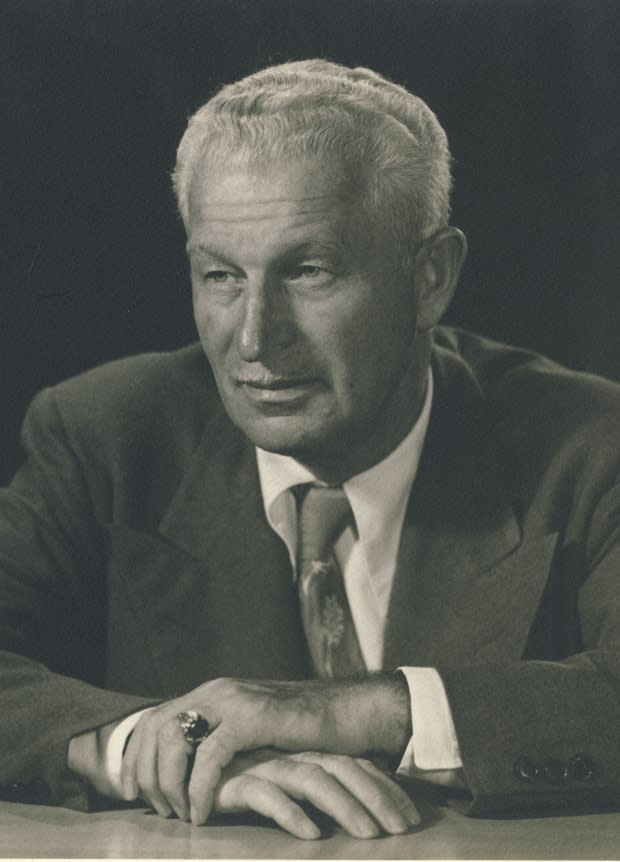Dilapidated Saint John commercial building was once a state of the art dairy
When Saint John businessman Adolph Stern announced plans to build a 12,000-bottle-a-day dairy plant on City Road in the early 1920s, it created controversy.
The milk and dairy products produced at Purity Ice Cream would be pasteurized, a process opposed by many of the industry's leaders in the province, who believed it unnecessary and expensive. It was welcomed, however, by public health officials concerned about infant mortality from diseases in raw milk.
The city's Daily Telegraph newspaper weighed in April 1923.
"The city of St John has a high infant mortality rate and it is felt that whatever might be personal feeling in the matter, a measure which it is hoped will mean the saving of about fifty lives each year should be welcomed."
Stern's red brick, partly three-storey, glass-walled factory opened the following month.
Building may be doomed
Nearly 100 years later the remaining section of the building sits vacant, declared dilapidated by city council and slated for demolition.
In more recent decades, 111-115 City Rd. was shared by a bakery and a tavern, but both businesses closed their doors over the past few years.
But records shared with CBC by the New Brunswick Archives show it was once a bright and impressive building.
The complete construction plans by Saint John architects, Mott, Myles and Chatwin are included in the archives collection.

A city man, John Cushnie, is hoping to save the century-old building in hopes of restoring the original factory look and developing it as an income property.
The archival drawings show siding and additions added in the decades after the building's construction have completely covered over a structure that once had three storeys of floor to ceiling windows facing south onto City Road.
"It sort of looks like the same building if you know what to look for," said archivist Mary-Ellen Badeau. "But if you're not used to looking at the architectural drawings you wouldn't just clue in."
"This is way more than we could have hoped for," said Cushnie, on learning of the drawings. "This is so exciting."
Purity Ice Cream was based in Saint John, with a dairy farm in South Bay, now part of the city's west side, and branch plants in Fredericton and Peticodiac.
Owner Stern began his life in Austria in 1894.

In 1905 his family emigrated to America.
Stern joined the U.S.Army during the First World War, but by 1919, for reasons that aren't clear, he, his parents and siblings had moved to New Brunswick and were operating the farm at South Bay.
More oriented to business than farming, Stern entered first the dairy and then the ice cream business.
A pasteurization leader
Badeau, who researched the Purity Ice Cream history for a 2016 article in Silhouettes, a newsletter for associates of the Archives, said Purity ice cream sales started at the farm itself before moving to a plant on Stanley Street in the city.
The City Road factory was designed around the pasteurization process.
At its rear was a railway siding. The company also had a fleet of trucks.
By 1929, the Purity Ice Cream company had been sold to Pacific Dairies and Stern, with bigger plans, was back in the U.S., trying to buy an operating dairy in New Jersey.
The attempted purchase failed, but he was struck by the long growing season available to farmers in the Vineland area of the state.

Stern then managed to persuade much of his family at home to pull up stakes and move their farm to Vineland, N.J.
"It was seen as a climate that was more conducive to farming," said Stern's nephew, Marc Stern, who chairs the board of the Los Angeles Opera. "You could get two or three crops a year rather than, in Saint John, one or two."
Around the same time, he made an abrupt career switch, jumping from business into law.
Family members aren't sure where he received his training but suspect it was in Canada.
Three of Adolph Stern's sisters, Anna Wiezel, Jennie Brownberg, and Nellie Hoffman, married Canadians and stayed behind with their families in Saint John.
Well-known Saint John families
Their grandchildren include members of the Wiezel and Davis families.
Adolph Stern's niece, Faith Stern said her uncle was the first member of the family to branch out from farming.
She describes him as a distinguished man with white hair who smoked a pipe.
"He was so different from so many of the rest of them because he was the lawyer," she said. "The rest of them were all farmers of one sort or another."
Marc Stern grew up working on the family's Vineland farms.
His uncle's law practice included work as city solicitor as well as solicitor for the Board of Education.

But he maintained his home close to his family on one of the farms.
"He was always very nice to me, I liked him a lot," he said.
"Sometimes, when I was working there and he came home from lunch, he would see me and he would invite me in to lunch. And that was like a real highlight as a young kid to have this prestigious uncle have you in to lunch."
Adolph Stern had four daughters.
He died in Pinellas, Fla., in 1964.


